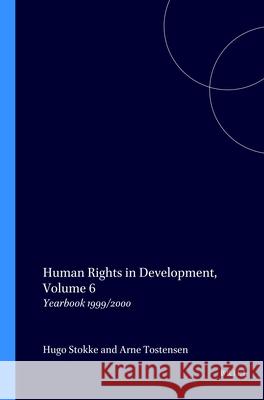Human Rights in Development, Volume 6: Yearbook 1999/2000 » książka
Human Rights in Development, Volume 6: Yearbook 1999/2000
ISBN-13: 9789041115768 / Angielski / Miękka / 2001 / 272 str.
The twelfth in the series of yearbooks on Human Rights in Development the current millennium edition attempts to take stock of developments in the human rights arena since the Universal Declaration was adopted over half a century ago. The introductory overview article chronicles developments within the human rights field to date and sets the stage for a future scenario by looking at the respective roles of governments and the business community in respecting, protecting and fulfilling human rights. An article on the World Trade Organisation follows the challenges posed by international trade in a human rights perspective. The appropriateness of so-called smart sanctions as a means of bolstering human rights is discussed in a third contribution. A fourth highlights the gender dimensions of the statute of the new international criminal court. The challenge of accommodating diversity and the rights of indigenous peoples in the new political dispensation of Guatemala is assessed in a fifth essay, whereas affirmative action policies within the context of Malaysia are examined in a sixth one. The difficulties inherent in designing, managing and evaluating aid programmes for human rights and democracy purposes is the theme of the penultimate contribution, whereas the final article considers the use of research in designing aid projects in the judicial system of Nepal. The Yearbook on Human Rights in Development is a joint project of European and Canadian research institutes and centres on human rights: the Chr. Michelsen Institute, Bergen; the Danish Centre for Human Rights, Copenhagen; the Icelandic Human Rights Centre, Reykjavik; the Ludwig Boltzman Institute of Human Rights, Vienna; the International Centre for Human Rights and Democratic Development, Montreal; the Netherlands Institute of Human Rights, Utrecht; the Norwegian Institute of Human Rights, Oslo; and the Raoul Wallenberg Institute of Human Rights and Humanitarian Law, Lund. The Yearbook is geared to a broad readership, including government agencies, donors, embassies, the mass media, non-governmental organisations, the academic community, and the interested public at large.











